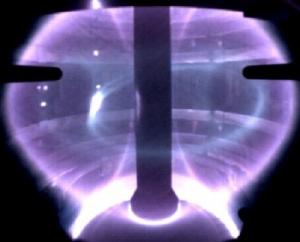Adding fuel to MAST's fire
15 Jul 2013
-
Culham Centre for Fusion Energy
Firing tiny deuterium pellets into the tokamak furnace is one of the most effective ways of getting fuel into the plasma, enabling fusion reactions and the unlocking of energy.
They call it the "snowball in hell"—a bullet of frozen deuterium fuel heading at high speed into the furnace-like plasma of the MAST fusion device at Culham. A team at MAST is investigating this method of fuelling plasmas and how it will work in the future on the giant international experiment ITER.
Firing these tiny pellets is one of the most effective ways of getting fuel into the plasma, enabling fusion reactions and the unlocking of energy. This will become increasingly important as future fusion devices become bigger and plasmas get hotter to reach ignition, the point at which the plasma heats itself without external input—crucial for power-producing reactors. To achieve ignition, the density of the plasma core must be raised and sustained by fuelling it.
Luca Garzotti, one of the CCFE physicists studying pellet injection on MAST, explains the process: "Just like a car engine, a tokamak needs to be fuelled—the fuel goes in to the plasma and there is an exhaust to get rid of unwanted gases. In fusion, helium comes out of the exhaust via a system called the divertor. I'm looking at how we can put the fuel (deuterium and tritium) in at the start.


